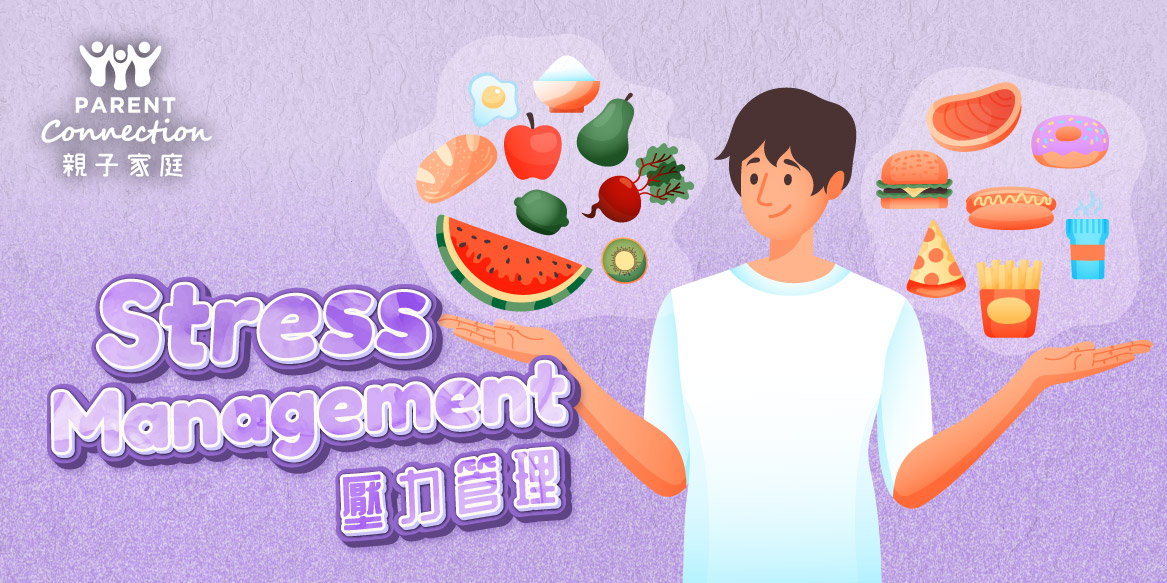[Parent Connection] Stress Management

The Impact of Food on Mental Health
As exam period approaches, students may find themselves overwhelmed and stressed. While stress is a natural response to challenging situations, a bit of stress can keep you focused and motivated; however, excessive stress can lead to negative impacts on mental health, including anxiety and depression.
Nutrition indeed plays an important role in maintaining mental health. Studies have shown that certain nutrients can help reduce stress and anxiety levels, while others can exacerbate these symptoms. Here are some examples on stress-relief nutrients:
- Tryptophan: an essential amino acid found in protein, which the body uses it to produce serotonin. Serotonin is a neurotransmitter that help regulate mood, sleep, reduce anxiety and make you “feel good”. Foods high in tryptophan include dairy products, turkey, chicken, beef, pork, tuna, eggs, tofu, and beans.
- Dopamine: the “happy hormone” dopamine is a neurotransmitter directly affects the reward system in the body, it helps us to strive, focus, and find things interesting. Low levels of dopamine can make you feel tired, moody, and unmotivated. Yet studies show that increase dopamine levels in brain may promote deep thinking and improve memory. Dopamine can be found in a wide range of food, such as protein-rich foods (i.e. turkey, beef, eggs, dairy products, soy, and legumes), nuts, dark chocolate, fruits and vegetables, in particular bananas.
- Omega-3 fatty acids: studies found that omega-3 fatty acids may reduce inflammation and improve mood by modulating dopamine concentrations. Foods rich in omega-3 include fatty fish, such as salmon and tuna, and other foods, such as walnuts and chia seeds.
- Vitamin Bs: particularly B6 and B12, are essential for neurotransmitter production and energy metabolism. Some studies have suggested that B vitamin supplementation may improve mood and reduce stress. Meat (beef, pork, etc.), poultry (turkey, chicken, etc.), fish (tuna, salmon, etc.), and fortified breakfast cereal are excellence sources of vitamin B6 and Vitamin B12.
- Probiotics and prebiotics: Recent research have shown that the gut microbiome, which is made up of trillions of bacteria that reside in the gut, can influence mental health by producing neurotransmitters and other signaling molecules that impact mood and behavior. Fermented foods such as kimchi and kefir contain probiotics, which have been shown to improve gut health and reduce anxiety.

Knowing what should consume more, now let’s learn about what should be limit down.
- Foods high in added sugar: consuming high-sugar foods can lead to a temporary feeling of pleasure or relief, as sugar activates reward centers in the brain and triggers the release of dopamine. However, this relief is often short-lived and can be followed by a crash in energy levels and mood, which can further exacerbate feelings of stress and anxiety. In addition, consuming too much sugar over time can lead to inflammation, insulin resistance, and weight gain, which can all contribute to chronic stress on the body and increase the risk of developing chronic diseases.
- Processed foods: Studies found that a diet high in processed foods was associated with higher levels of perceived stress, as well as greater symptoms of depression and anxiety, compared to a diet high in whole foods.
- Caffeine and alcohol: While caffeine and alcohol can provide temporary relief from stress, they can also exacerbate symptoms in the long run. Try to replace with herbal tea or lemon water instead.
To concluded, it is important to consume a varied, well-balanced diet, and try incorporating those foods into your diet to support your mental health. Finally, exercise has been shown to increase the levels of dopamine (“the happy hormone”). Improvements in mood can be seen after 10 minutes of aerobic activity and reaches best effects after 20 minutes of exercise.

References:
- Gibson, E. L. (2019). Nutritional influences on stress-induced brain plasticity. Nutritional neuroscience, 22(5), 291-304.
- Jacka, F. N., O’Neil, A., Opie, R., Itsiopoulos, C., Cotton, S., Mohebbi, M., … & Berk, M. (2017). A randomised controlled trial of dietary improvement for adults with major depression (the ‘SMILES’trial). BMC medicine, 15(1), 1-13.
- Mayer, E. A., Knight, R., Mazmanian, S. K., Cryan, J. F., & Tillisch, K. (2014). Gut microbes and the brain: paradigm shift in neuroscience. Journal of Neuroscience, 34(46), 15490-15496.
- Parletta, N., Zarnowiecki, D., Cho, J., Wilson, A., Bogomolova, S., Villani, A., … & Meyer, B. (2017). A Mediterranean-style dietary intervention supplemented with fish oil improves diet quality and mental health in people with depression: A randomized controlled trial (HELFIMED). Nutritional neuroscience, 20(10), 702-713.
- Stough, C., Scholey, A., Lloyd, J., Spong, J., Myers, S., & Downey, L. A. (2011). The effect of 90 day administration of a high dose vitamin B-complex on work stress. Human Psychopharmacology: Clinical and Experimental, 26(7), 470-476.
- Young, S. N. (2013). The effect of raising and lowering tryptophan levels on human mood and social behaviour. Philosophical Transactions of the Royal Society B: Biological Sciences, 368(1615), 20110375.
- McMartin, S. E., Jacka, F. N., & Colson, N. J. (2019). The association between diet quality and mental health during the perinatal period: a systematic review. Journal of Developmental Origins of Health and Disease, 10(5), 547-565.
- Hansen, C. J., Stevens, L. C., Coast, J. R. (2001). Exercise duration and mood state: how much is enough to feel better? Health Psychol. 2001 Jul;20(4):267-75.

